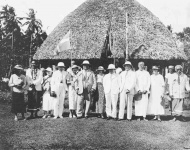Events In History
-
 19 July 1982Privy Council rules on Samoan citizenship
19 July 1982Privy Council rules on Samoan citizenshipThe Privy Council granted New Zealand citizenship to Western Samoans born since 1924. When the government challenged this ruling, it was accused of betrayal and racism. Read more...
-
 28 December 1929'Black Saturday' - NZ police open fire in Apia
28 December 1929'Black Saturday' - NZ police open fire in ApiaNew Zealand had been granted a mandate over the former German colony following the First World War. Growing Samoan calls for independence came to a head during a Mau demonstration in Apia which left 12 people dead. Read more...
-
 29 August 1914NZ force captures German Samoa
29 August 1914NZ force captures German SamoaColonel Robert Logan led a 1400-strong expeditionary force to capture German Samoa (later renamed Western Samoa). The Germans stationed there were in no position to resist. Read more...
 Robert Logan
Robert Logan
Robert Logan ran the military administration of German Samoa on behalf of Britain during the First World War.
Read more...Articles
The 1918 influenza pandemic

The lethal influenza pandemic that struck New Zealand between October and December 1918 killed more than 8600 people in two months. No other event has claimed so many New Zealand lives in such a short time.
-
Page 9 – Influenza in Samoa
The total number of deaths attributable to influenza is estimated to have reached 8500, or 22% of the Samoan population
New Zealand in Samoa

New Zealand was ill-equipped to cope with the Western Samoa mandate allocated by the League of Nations in 1920. The Mau movement's passive resistance culminated in the violence of 'Black Saturday', 28 December 1929, which left 11 Samoans and one New Zealand policeman dead.
-
Page 2 – Background
When war broke out in Europe in August 1914, Britain asked New Zealand to seize German Samoa as a 'great and urgent Imperial service'.
-
Page 3 – Colonial administration
The League of Nations formally allocated New Zealand the Class C mandate of Western Samoa in December 1920. Samoan leaders were not consulted as other nations decided Samoa's
-
Page 4 – Sowing seeds of discontent
By 1926, anti-New Zealand feeling was strong throughout Samoa.
-
Page 5 – The rise of the Mau movement
Samoa has a history of opposition to European rule, but the opposition that emerged in the late 1920s was organised and widespread.
-
Page 6 – Stepping up the Mau campaign
In January 1928 Mau policeman, dressed in a uniform of a purple lavalava with a white stripe, began enforcing a sā - ban - on European stores in Apia.
-
Page 7 – Black Saturday
One New Zealand policeman and up to 11 Samoans, including Tupua Tamasese Lealofi III, were killed in Apia on Black Saturday - 28 December 1929.
-
Page 8 – Towards independence
On 4 June 2002 Prime Minister Helen Clark offered 'a formal apology to the people of Samoa for the injustices arising from New Zealand's administration of Samoa in its earlier
-
Page 9 – Further information
Find out more about New Zealand in Samoa.
Capture of German Samoa

When war broke out in Europe in August 1914, Britain asked New Zealand to seize German Samoa as a ‘great and urgent Imperial service’. Although the tiny German garrison offered no opposition, at the time it was regarded as a potentially risky action.
-
Page 2 – New Zealand in the Pacific
Samoans were not consulted when Britain, Germany and the United States agreed to partition their islands in December 1899.
-
Page 3 – Seizing German Samoa
With hindsight, New Zealand's capture of German Samoa on 29 August 1914 was an easy affair. But at the time it was regarded as a potentially risky action with uncertain
-
Page 4 – Wartime administration
German officials were replaced by New Zealand military officers, civilians, or British residents. These often lacked the experience or qualifications to do the job.
New Zealand and the United Nations

New Zealand has a tradition of commitment to the concept of collective security. It was a member of the League of Nations between the world wars and was active in the establishment of the United Nations in June 1945.
-
Page 3 – Participation in the United Nations
The United Nations Charter established six principal organs to achieve its aims. New Zealand has played a part in all of these organs.
The 1920s

The 1920s was the decade that modern New Zealand came of age. Despite political and economic uncertainty, the country shrugged off the gloom of war to embrace the Jazz Age - an era of speed, power and glamour. Explore an overview of the decade and a year-by-year breakdown of key events.
- Page 12 - 1929 - key eventsA selection of key New Zealand events from
Read the Treaty

Transcript of the English version of the original Treaty of Waitangi document.
- Page 4 - Treaty of Waitangi translationsThe Treaty of Waitangi translated into Cook Islands, Samoan, Tongan, Niuean and Tokelau
Related keywords
- hms philomel
- german samoa occupation
- royal navy
- horses
- WW1
- postal service
- stamps
- citizenship
- 1980s
- robert logan
- influenza pandemic
- protest
- police
- mau movement
- pacific islanders
- olaf nelson
- league of nations
- international relations
- british empire
- maps
- united nations
- korean war
- peter fraser
- 1920s
- german navy
- cook islands
- niue
- tonga
- tokelau
- treaty of waikato
- labour party
- helen clark
- women
- new zealand truth
- clothing
- funerals
- transport
- murchison
- theatre
- murchison earthquake
- tongariro
- cartoon
- flags
- race relations
- postcard
- international trade
- chinese
- navy
- disasters
- health
- epidemic
- disease
- maori health
- death






























